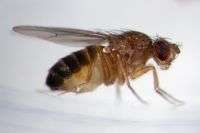Fruit flies earn no respect, except among scientists

That annoying kitchen pest, the fruit fly, occupies an honored place in science and medicine, despite slurs from politicians such as Sen. John McCain and his 2008 sidekick, Sarah Palin.
Scientists have been studying these dinky insects for more than a century, but they say that they're still turning up valuable new information in more than 1,000 laboratories all over the world.
Fruit fly research is contributing to biomedical advances against autism, birth defects, diabetes, Alzheimer's, heart disease, cancer and a host of other maladies. It also sheds light on the intricate process by which a single fertilized cell develops into an adult human being.
Four Nobel prizes have been awarded for work on Drosophila, the scientific name for the fruit fly. It means "dew-lover" in Greek.
"The humble fruit fly has been a workhorse for biologists for almost a century," said Scott Hawley, a cancer genetics expert at the Stowers Institute for Medical Research in Kansas City, Mo. "No other organism has contributed more to our understanding of evolutionary and population biology than Drosophila."
Scientists prize fruit flies as ideal model organisms for study because they're cheap, easy to raise and can produce 200 offspring in a life cycle of only 10 days.
Unlike houseflies, they carry no diseases. They can, however, damage fruit crops, such as California's olive groves, a behavior that brought them a dash of ill repute in last year's election.
To protect his state's olive growers, Rep. Mike Thompson, D-Calif., inserted a $742,764 "earmark" in the last congressional appropriations bill to research ways to control the pests. Some of the money is to be spent in France, where the U.S. Department of Agriculture has a research station.
Palin, then the Republican vice presidential candidate, snatched at this item. She scoffed at "dollars that have little or nothing to do with the public good, things like fruit fly research in Paris, France. ... I kid you not."
In the Senate last month, McCain again singled out fruit fly research in his condemnation of budget earmarks.
Despite such jibes, modern science is deeply indebted to the fruit fly.
"These studies established our understanding of the basic principles of genetics," said Carl Thummel, a fly researcher at the University of Utah School of Medicine in Salt Lake City. Fly research revealed "the nature of the gene, how genes are linked to one another along the chromosome and how chromosomes can recombine with one another."
Despite their enormous differences, flies and humans descended from a distant common ancestor and share many genes that control similar biological functions.
"Seventy percent of human and Drosophila genes are conserved, meaning the genes resemble each other in structure and still carry out a related or identical function," said Allan Spradling, a biologist at the Carnegie Institute of Washington in Baltimore. "It is much easier to understand gene function in Drosophila than in humans."
"The same tool kit establishes body plans in flies and humans," said Terry Orr-Weaver, a Drosophila expert at the Whitehead Institute for Biomedical Research in Cambridge, Mass. "The same genes build the fly eye and the human eye."
A few of the many recent achievements in fruit fly research:
• Rolf Bodmer at the Burnham Institute for Medical Research in La Jolla, Calif., identified genes in Drosophila that cause heart rhythm defects in eight out of every 1,000 babies born each year.
• Scientists at the University of North Carolina at Chapel Hill discovered a Drosophila protein called neurexin that's a risk factor for autism.
• Researchers at the Langone Medical Center in New York discovered an enzyme connected to Barth syndrome, a sometimes-fatal childhood heart disease.
"This is good news for patients, since this enzyme is now a potential target for therapeutic intervention," Langone's Michael Schlame said.
Fruit fly researchers share their findings in a vast data bank called "FlyBase." They call each other "fly persons." Thummel is the president of the North American Drosophila Board, which puts out regular "white papers" summarizing the state of fly research.
"A hundred years working with this organism and we are really now just hitting our stride," Hawley said. "There is so much more to come."
___
ON THE WEB
The database on fruit flies: www.flybase.org
The latest data on fruit flies: tinyurl.com/cgns6c
___
(c) 2009, McClatchy-Tribune Information Services.
Visit the McClatchy Washington Bureau on the World Wide Web at www.mcclatchydc.com














